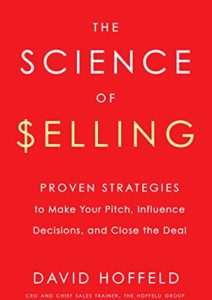“Does behavioral science explain why Donald Trump is so popular?” This is one of the questions that was recently posed to me when I was a guest on a radio show.
As a behavioral strategist who specializes in helping sales people utilize behavioral science to sell more, I have often been struck by how much of what has made Donald Trump so influential is also applicable in selling.
Trump is a polarizing figure, but whether you like him or hate him, there is no doubt that he is effectively “selling” himself. Voters are frustrated and though the current political climate has allowed Trump to thrive, it is not the only factor. Trump is leveraging numerous principles from behavioral science that are generating extraordinary amounts of influence.
Though there are many scientific principles that illuminate why Trump is resonating with voters, the following are three that sales people can also utilize to boost their influence and earn more sales.
1. Authenticity Matters
In the sea of politicians who pander to what voters want to hear, Trump stands out as being authentic. He is a nonconformist. Though many people are troubled by some of his comments, no one can deny that he is genuine. He says what he thinks and then stand behind his remarks.
The reason authenticity matters so much is because it is a precursor to trust. If you believe that a person is not being genuine, it will erode your trust in what he or she says.
In selling, a lack of authenticity has devastating impact. Buyers are often leery of sales people because they have met sales people who are inauthentic. Sales people who will say whatever they need to get the sale. Though this type of sales person is no longer common, the stereotype still exists.
When sales people are not authentic, buyers sense it. When they encounter a sales person who is inauthentic, buyers will simply take their business elsewhere.
2. Focus on Contrasts
Voters have become increasingly frustrated with politicians. To differentiate himself, Trump reminds voters that he is not a politician, but a successful business man.
Trump also confirms that lobbyists and special interest groups give money to political campaigns knowing that politicians will reciprocate with political favors. In contrast, Trump distances himself by calling attention to the fact that he is a billionaire and cannot be bought.
Trump is a master at leveraging the principle of contrast. He consistently contrasts himself with his opponents.
When sales people utilize the science of contrasting, their ability to sell is enhanced because they are aligning how they present information with how the brain is wired to construct decisions.
For example, one research experiment identified that when consumers were shown an electronic product only 10% purchased. However, when two of the products were shown, sales skyrocketed, as an impressive 66% purchased.
Sales spiked when consumers were shown two options because they intuitively compared the options and select the best. This comparison reduced the perception of risk and inspired the confidence to make the buying decision.
3. Establish Authority
Trump has a reputation for being an authority, an expert who gets results. He is legendary for his ability to make highly profitable real-estate investments. He also has been the star of the reality television shows, The Apprentice and The Celebrity Apprentice. On these shows he is the final judge on whether someone did a good job or bad job. He decides if they are hired or fired.
Trump is perceived as being an expert deal maker. This is why when he proclaims that the leaders of the United States make bad deals that give other countries an advantage, people listen. He also promises that if he were President, he would make sure that the country was the recipient of great deals. Trump’s authority in this area gives a lot of clout to his promises.
When sales people are perceived as being an authority, buyers are more likely to take what they say seriously and act on it. There are some very famous research studies that have confirmed that people generally will respond more positively when an authority states something than when a person who is not an authority says that same thing.
There are many ways that sales people can position themselves as authorities. One of the most effective ways is to convey meaningful insights to buyers throughout the sales process. These insights can take the form of a new idea, strategy or research report that delivers value to buyers.
When sales people share significant insights with buyers, they establish themselves as an authority which will cause them to be perceived as a valued resource. This will deepen their relationships with buyers and inspire trust.
Regardless of what your think of Trump’s political views, personality or whether or not he would be a good Commander and Chief, he is using science-based levers of influence to gain a tremendous amount of sway with voters. Though it remains to be seen if he will win the election, what is for sure is that the three previously describes scientific principles are here to stay.
Photo credit: Gage Skidmore













































